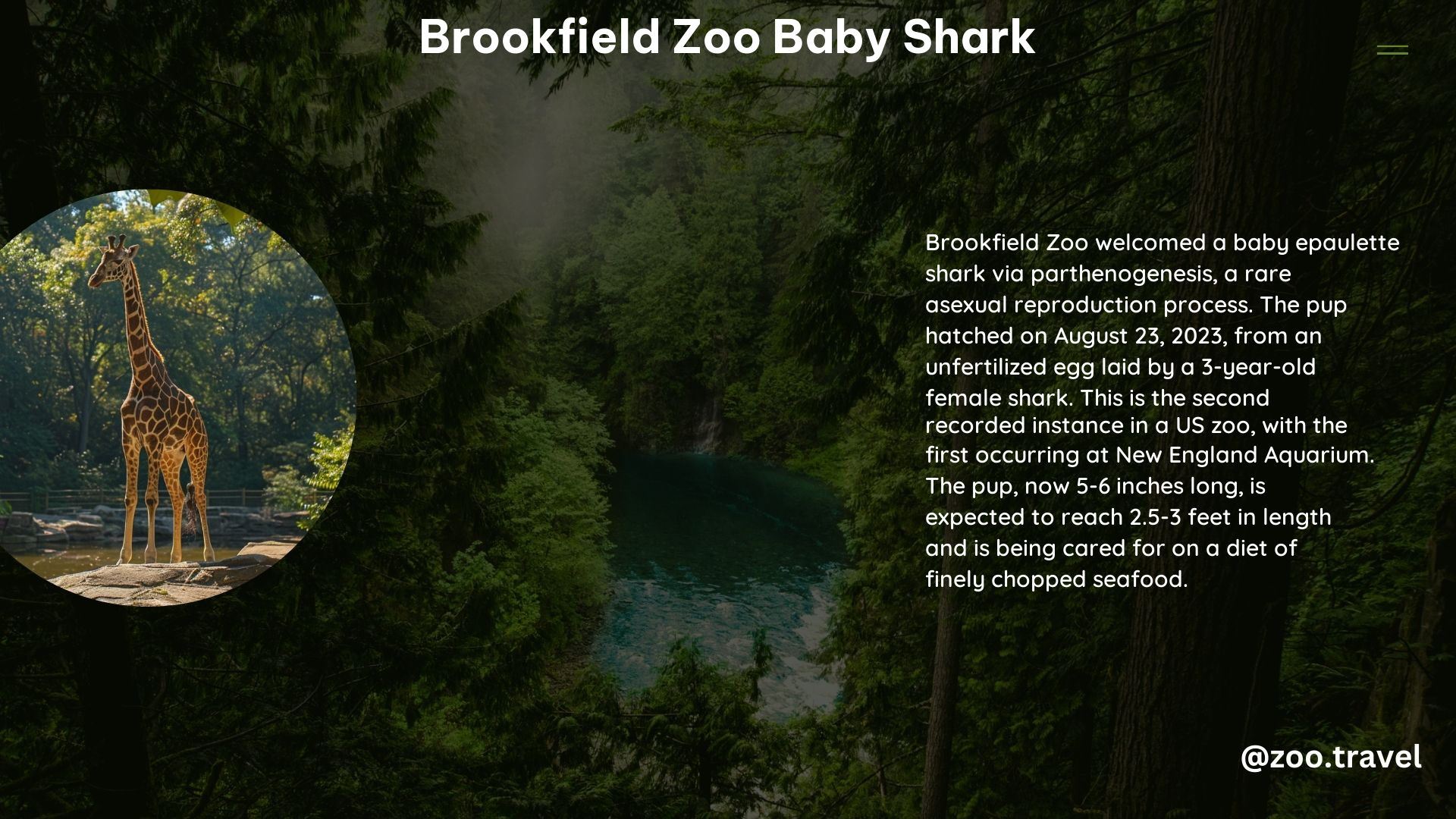The Brookfield Zoo in Illinois has recently welcomed a remarkable addition to its marine life collection – a baby epaulette shark born through the process of parthenogenesis, a rare form of asexual reproduction. This extraordinary event has captivated the attention of zoo enthusiasts and shark researchers alike, as it represents only the second recorded instance of its kind in an Association of Zoos and Aquariums-accredited facility.
The Remarkable Epaulette Shark
The baby shark, born on August 23, 2023, belongs to the species of epaulette sharks, known for their unique ability to “walk” on the seafloor using their muscular pectoral fins. These sharks are also recognized for their distinctive false eyespots, which they use to appear larger and deter potential predators.
Key Details about the Brookfield Zoo Baby Shark
| Characteristic | Details |
|---|---|
| Species | Epaulette shark |
| Birth Date | August 23, 2023 |
| Reproduction Method | Parthenogenesis (asexual reproduction) |
| Mother’s Age | 3 years old (arrived at the zoo in 2019) |
| Current Size | 5-6 inches long |
| Expected Adult Size | 2½ to 3 feet in length |
| Diet | Finely chopped capelin, minced squid tentacles, and other finely chopped seafood |
| Unique Features | Ability to “walk” on the seafloor using their muscular pectoral fins, false eyespots behind their head to appear larger |
The Rarity of Parthenogenesis in Sharks

Parthenogenesis, the process by which an embryo develops from an unfertilized egg cell, is an unusual phenomenon in complex vertebrates like sharks. This is only the second recorded instance of parthenogenesis in epaulette sharks at an Association of Zoos and Aquariums-accredited facility, with the first instance occurring at the New England Aquarium.
While parthenogenesis is more common in certain jawed vertebrates, it is less so in mammals. The mother shark had previously laid nonviable eggs, but one unexpectedly hatched into a healthy pup, surprising the zoo staff and researchers.
Monitoring and Care of the Brookfield Zoo Baby Shark
The Brookfield Zoo staff has been closely monitoring the baby shark and consulting with the New England Aquarium regarding its care. They are ensuring that the pup receives the proper nutrition and environment to thrive, as the successful rearing of this rare specimen is of utmost importance.
Feeding and Habitat
The baby shark is currently being fed a diet of finely chopped capelin, minced squid tentacles, and other finely chopped seafood. The zoo’s aquarium team is carefully tailoring the pup’s diet to meet its specific nutritional needs and support its growth.
The baby shark’s habitat is designed to mimic its natural environment, providing the appropriate water temperature, pH, and other parameters to ensure its well-being. The zoo’s experts are closely monitoring the pup’s behavior and making adjustments as necessary to ensure its optimal development.
Significance and Implications
The birth of the Brookfield Zoo baby shark through parthenogenesis is a significant event in the world of shark research and conservation. This rare occurrence provides valuable insights into the reproductive biology of these fascinating marine creatures and can contribute to our understanding of their evolutionary adaptations.
Furthermore, the successful rearing of this baby shark could have implications for the conservation of epaulette sharks and other threatened shark species. The knowledge gained from this experience can be applied to captive breeding programs and reintroduction efforts, potentially aiding in the recovery of vulnerable shark populations.
Visiting the Brookfield Zoo Baby Shark
If you’re a zoo enthusiast or a shark lover, the Brookfield Zoo is the place to visit to witness this remarkable baby shark. The zoo’s staff is eager to share this unique story with visitors and provide educational opportunities to learn more about the epaulette shark and the process of parthenogenesis.
To plan your visit, you can contact the Brookfield Zoo at (773) 509-5623 or [email protected] for the latest updates on the baby shark’s progress and any special events or exhibits related to its birth.
Conclusion
The birth of the Brookfield Zoo baby shark through parthenogenesis is a truly remarkable and rare event that has captivated the attention of the scientific community and the general public alike. This asexual reproduction in a complex vertebrate like a shark is a testament to the wonders of the natural world and the ongoing discoveries in the field of marine biology.
As the Brookfield Zoo continues to monitor and care for this special pup, we can look forward to learning more about the epaulette shark and the implications of this unique birth for the conservation of these fascinating creatures.
References
- CBS News: “Baby Shark Born to Mother, No Father: Parthenogenesis at Brookfield Zoo”
- Brookfield Zoo: “Epaulette Shark Hatches at Brookfield Zoo”
- KCRG: “Baby Shark Born via Asexual Reproduction, Only 2nd Recorded Instance in U.S. Zoo History”
- WTTW News: “Brookfield Zoo Welcomes Baby Shark in Rare ‘Virgin Birth’”
